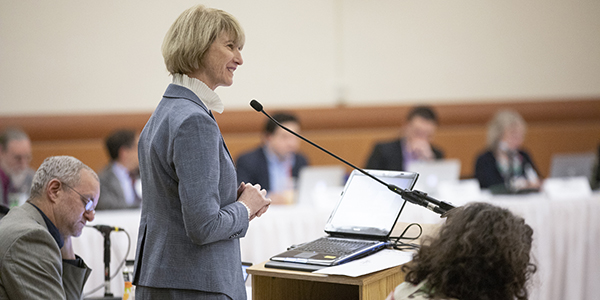SUNY Chancellor Kristina Johnson speaks to University-wide Faculty Senate
Chancellor addresses sustainability, diversity and more in remarks during meeting held at Binghamton University.

SUNY Chancellor Kristina Johnson spoke to the University Faculty Senate during its fall 2018 plenary meeting held at Binghamton University Oct. 18-20.
After answering questions from senators representing each sector of the system, she spoke about attracting new students, online education, shared governance, diversity of faculty and the overall sustainability of the SUNY system.
“It’s clear that we all care deeply about the work we do and the students we teach,” Johnson said. “SUNY is vast, but young and agile, with one common purpose: to learn, to search and to serve and to provide the broadest access to higher education at the highest quality.
“We are the university of access and excellence,” Johnson said, as she spoke about collaboration across the system and the need to work together, share best practices and ensure the seamless mobility for students. “We educate a third of all graduates of higher education in the state of New York,” she said, including students from the lowest to the uppermost quintile of income.
The 64-campus system also shares values: to be student-centered, have shared governance, be diverse, collaborate, be engaged with our communities, and have integrity and collegiality.
Johnson referred to her inauguration address, when she spoke about her vision that our students will live at the height of our times. “We must understand the culture of our times, how humans relate to one another and what came before. My vision involves a broadening of higher education from institutionalized to individualized, from silos to networking,” she said.
Johnson said she is committed to shared governance and asking for help in addressing the challenges that face higher education and the SUNY system, and sustaining the system is a top priority.
To be sustainable, both environmentally and financially, the system and its campuses will need to attract new students, take individualized education to scale and also increase entrepreneurialism and innovation, she said. One way to achieve these aims is through online education, as she reminded the senators that higher education options outside of SUNY are often not affordable or quality.
“Sustainability is a big deal for me and where my work diverges a bit,” Johnson added. “As chancellor, I have to be responsible for the vibrancy and sustainability of the system. I will make sure we are using our dollars in a way to give a maximum return. I feel very up to the challenge.”
A SUNY task force with representation from the different sectors has been formed “to really look at finding a solution to how the education of the future plays into what SUNY will do,” Johnson said.
“We will be breaking new ground and want to hear about models that are working well,” she added. “I’ve asked the provost to be the intellectual leader from the system perspective and to engage with campus leaders. It will be a collaboration and with the resources you tell us that you need.”
As the campuses and system think about how to attract and retain students, they also must think about how to grow our faculty and what the composition of that faculty will look like, Johnson said, noting that less than 9 percent of SUNY faculty are from underrepresented backgrounds. “How can we attract more diverse faculty?
“The postdoctoral diversity program at Binghamton is one way,” she said. “Come on board and do a post-doc and teach and begin your research before the tenure clock starts.
“We’re ramping up and it will take time to get there, but faculty diversity is very important to me,” she added.
“I’m interested in amplifying our impact through our education and creativity,” she said. “I’m looking to more of the campuses working together and developing partnerships as very key. We’re making an impact. We just have to start telling people.”

